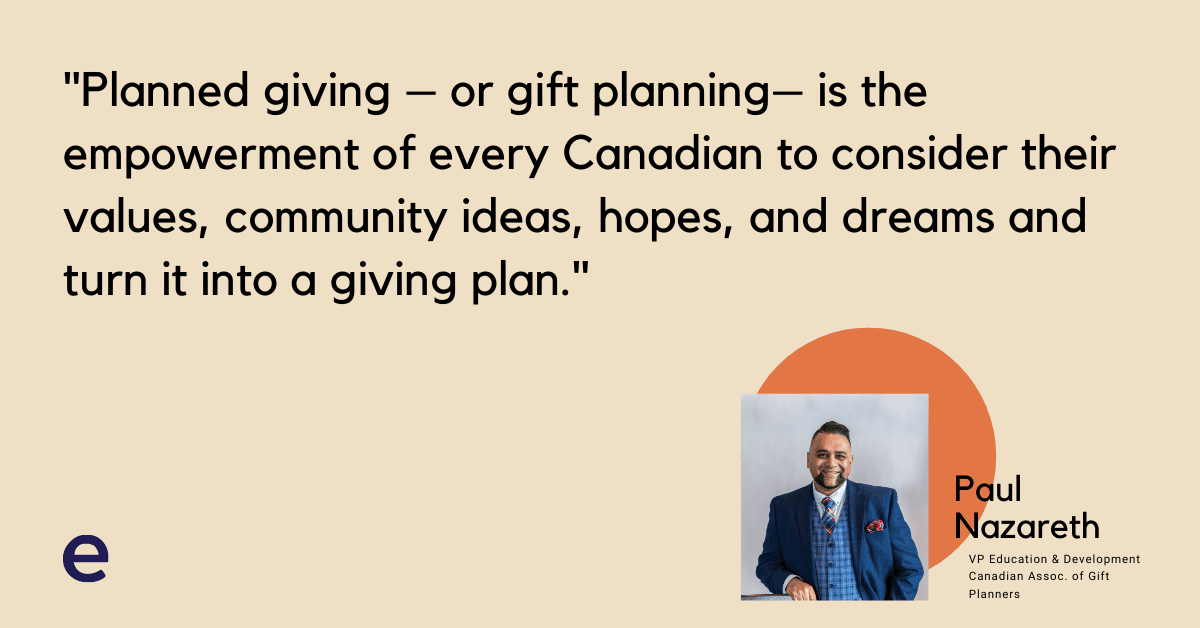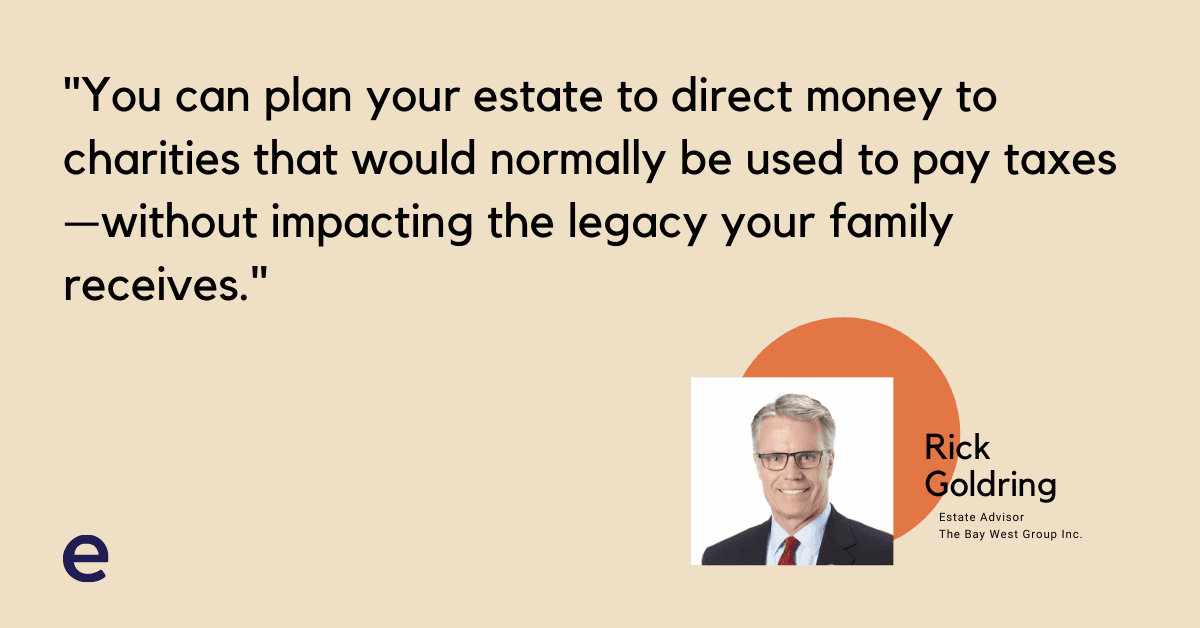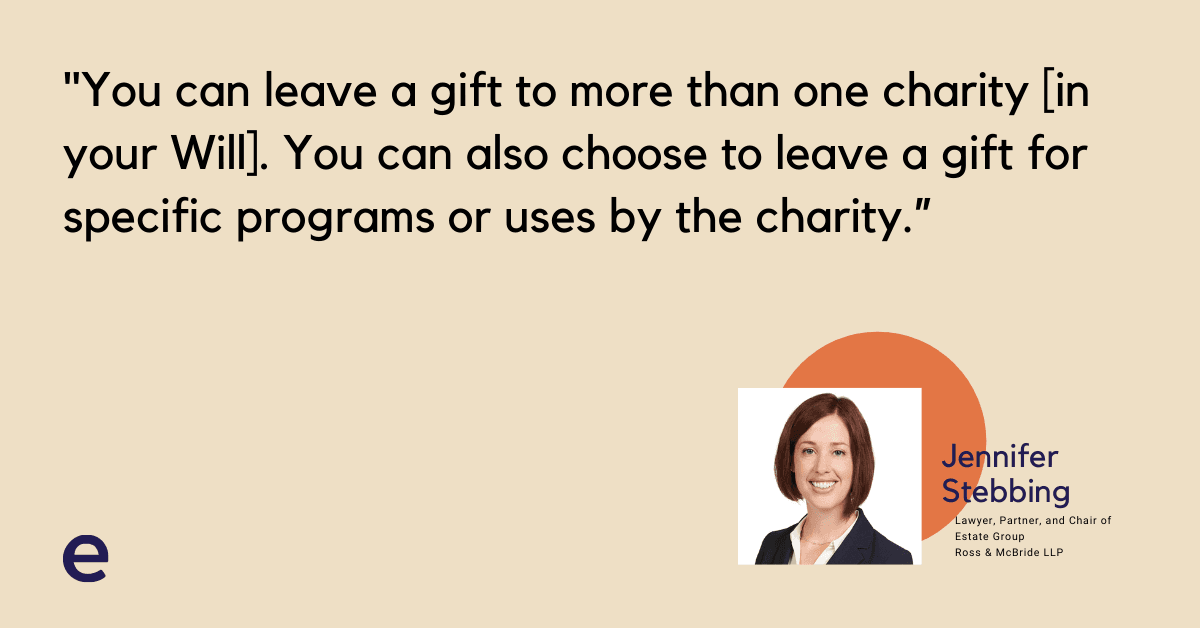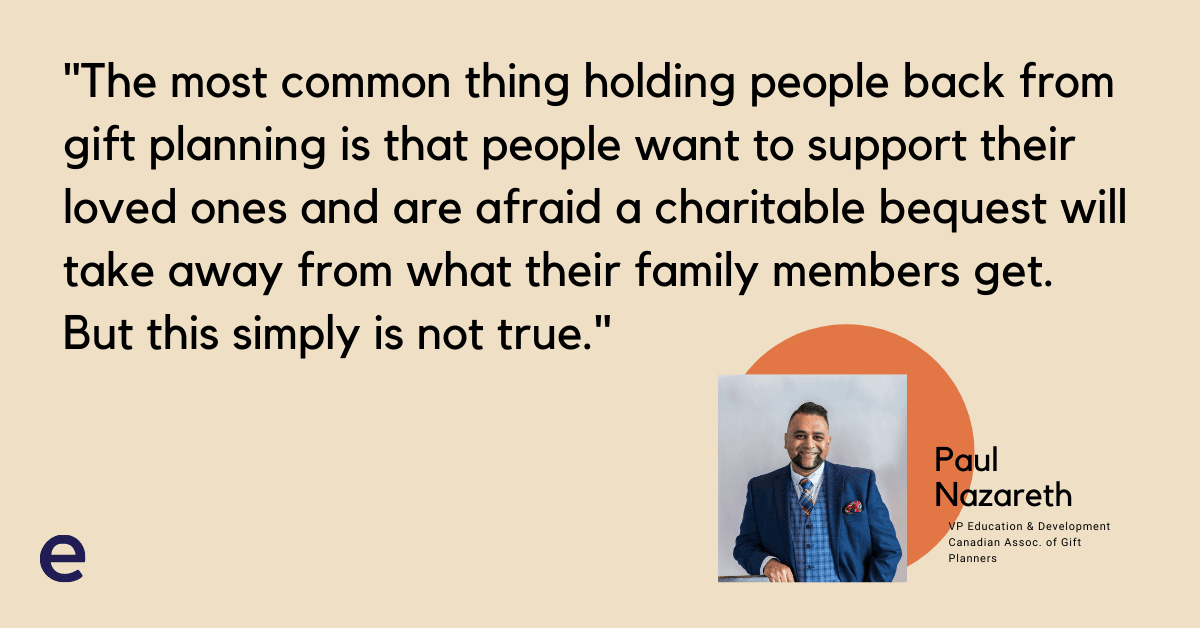Planned Giving: The Experts Weigh In

September 5 was the International Day of Charity. And while we deeply believe charitable giving is something that should be thought of year-round, having an international day helps facilitate essential conversations around donating and legacy planning.
Canadians love to give. According to a new survey by the Canadian Association of Gift Planner’s, 82% of Canadians donate to charities throughout their lifetime. But when it comes to planned giving, only 5% leave a gift to a charity in their Will. So, what’s the deal with the 77% discrepancy?
We are charitable folks, so why not take the opportunity to have an even more significant impact on the causes that matter most to us? Leaving a gift to a charity you care about in your Will can have a bigger impact than all the donations you make in your entire life combined. Plus, there are some key benefits you might be missing out on by leaving a charity out of your Will.
But don’t take my word for it—let the experts explain! I reached out to three leading experts in the charitable giving and estate planning space to weigh in, debunk some common myths, and break down the profound benefits you could be missing out on by not considering planned giving.
Meet the experts

What's the difference between charitable giving and planned giving?
Paul Nazareth: “Planned giving – or gift planning– is the empowerment of every Canadian to consider their values, community ideas, hopes, dreams, and turn that into a giving plan. Add that to the fact that Canada has the most advantageous tax benefits for giving in life and through one's estate and people are surprised how much they can make a difference!”

Rick Goldring: “Charitable giving takes place during one's lifetime whereas planned giving refers to donations made at death that maximize tax and estate planning benefits."
Should people include planned giving as part of their overall estate planning and why?
Paul Nazareth: “Whether or not you include gift planning as part of your overall estate planning depends on your values, beliefs, and desire to do good. But what you need to know is that it does NOT need to be a choice between loved ones and charity—the government gives Canadians a major tax benefit if they leave a bequest. This is not philanthropist stuff, everyday Canadians can do this!”
Jennifer Stebbing: “If you wish to benefit a charity after your death, then yes, planned giving should be part of your overall estate planning. There are many tax advantages to doing so."
Rick Goldring: “Canada is one of the world’s best countries in large part because of the tremendous impact of registered charities. You can plan your estate to direct money to charities that would normally be used to pay taxes—without impacting the legacy your family receives. By planning ahead, you can make a real difference for your family and your favourite charities!”

What are the different ways you can leave a gift to a charity as part of your legacy?
Jennifer Stebbing: “You can leave a specific sum or a percentage of your estate to a charity in your Will. And you can leave a gift to more than one charity. You can also choose to leave a gift for specific programs or uses by the charity (always contact the charity first if this is the case.)”

Rick Goldring: “There are many different ways to leave a gift to charity, including a simple bequest in your Will for a specific dollar amount or percentage of your estate as well as appointing a charity to be beneficiary for some or all of your RRSP or RRIF.
A specific bequest can include gifts in kind, like appreciated securities and real estate. Life insurance is an extremely effective and efficient way to leave money to charity. You can buy a new policy, donate it to the charity, and each year donate the cost of the premium and receive a tax receipt for that amount.
Some people can donate existing life insurance policies that are no longer required, resulting in a significant tax receipt. Other more complex strategies can fit certain circumstances, including charitable gift annuities and insured annuities, setting up a foundation and using donor-advised funds, and a charitable remainder trust.”
What are some common reservations you've heard when it comes to planned giving?
Paul Nazareth: “The most common thing holding people back from gift planning is that people want to support their loved ones and are afraid a charitable bequest will take away from what their family members get. But this simply is not true. In fact, Canada has the best bequest incentives in the world!”

Jennifer Stebbing: “Some people are concerned about the charity not existing when they pass. You can add a specific clause into your Will to address this.”
Rick Goldring: “The most common reservation people have about planned giving is that leaving money to charity will impact the legacy that their family receives. Most people are unaware of the income tax impact upon death and the very generous tax rules we have in Canada relating to donating to charity. If you have a choice between three possible beneficiaries and you can only pick two of Family, Government, or Charity, which two do you choose? With proper advanced planning, tax can be reduced dramatically (or eliminated) with the legacy being left for family and charity being maximized.”
Name a charity that means a lot to you and explain why.
Paul Nazareth: “I am passionate about public libraries and have a bequest to my library system in gratitude for when they were there for me early in my life and career. I wouldn't have the life I do today without the library, and I want them to have the funds to keep innovating and to protect and advance knowledge and love of the written word!”
Jennifer Stebbing: “The Canadian Celiac Association as I am Celiac, and they do excellent work.”
Rick Goldring: “Halton Women's Place provides shelter and crisis services for physically, emotionally, financially, and sexually abused women and their dependents. They are dedicated to ending violence against women and their children. This is a cause that many people want to ignore, and that is one of the reasons why I want to shed more light on what Halton Women's Place does. The more awareness, education, and support; the greater the impact on reducing and ultimately eliminating violence and abuse of women.”
Ready to consider planned giving? Here’s how to get started!
By now, it should be clear that planned giving–or gift planning–has many benefits. Not only can you support the charities and causes that matter most to you, but, if done strategically, you can experience many tax benefits.
Jennifer points out, “the first step to planned giving is to decide what charity you would like to benefit.” If you don’t already know which charities you want to support, that’s ok. It can be overwhelming to narrow it down to just a few from the 85 000 registered charities in the CRA database. But the best way to get started is just to dive in and start having conversations and asking questions.
According to Paul, “if you want to explore local charities and ways to give, your local Community Foundation can help with insight and information in a neutral and well-informed way.” And once you have a shortlist of causes you care about, speak with them directly! “Most charities are ready to talk to you about what a bequest can do. It's in the future, so there's no pressure to give or commit now.”
Once you know which charities you want to leave a gift to, Rick recommends connecting with an advisor or someone who has a specialty in planned giving: “Once you have found the right advisor, they should ask you for some information. This includes:
A list of your sources of income
A list of expenses, assets, and liabilities
Which charities you want to leave money to.
Based on the information provided, the advisor can put together a plan that shows how your family and charitable legacy can be maximized while minimizing tax.”
Wanna learn more? Watch this IGTV where Epilogue co-founder, Arin Klug, and Paul Nazareth do a deep dive on the planned giving space:
Next steps
If you have any more questions on planned giving, reach out to any of our experts for more guidance and information!
If you’re ready to make your Will and leave a gift to a charity, get started with Epilogue today and search for your preferred charities by name and location using our proprietary CRA plugin.
And if you’re already an Epilogue customer, login to your dashboard and update your Will for free to include one or more charities!









